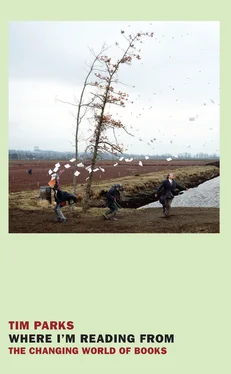“I read foreign novels because they’re better,” was a remark I began to expect. (Surprisingly, a senior member of the Dutch Fund for Literature also said this to me.) I asked readers if that could really be the case; why would foreign books be “better” across the board, in what way? As the responses mounted up, a pattern emerged: these people had learned excellent English and with it an interest in Anglo-Saxon culture in their school years. They had come to use their novel reading (but not other kinds of reading) to reinforce this alternative identity, a sort of parallel or second life that complemented the Dutch reality they lived in and afforded them a certain self-esteem as initiates in a wider world.
Apart from the immediate repercussions on the book market, where there is now fierce competition between English and Dutch editions of English-language novels, the phenomenon suggests a few things about reading and the modern psyche. There appears to be a tension, or perhaps necessary balance, between evasion and realism in fiction, between the desire to read seriously about real things—to feel that one is not wasting time, but engaging intelligently with the world—and simultaneously the desire to escape the confines of one’s immediate community, move into the territory of the imagination, and perhaps fantasize about faraway places.
For Europeans, one way to satisfy both desires is to read novels translated from English. These works tend to talk about a culture that is to them far away but relevant because of the dominance of Anglo-Saxon and specifically American culture worldwide, and because they themselves have acquired English as a second language; in most translations there will usually be some memory or trace of the original language, which, for those who are familiar with it, will reinforce their sense of knowing that other world. This may be simply the names of people or places, references to customs or a cultural setting, or, inevitably, some syntactical or lexical habit that appears more often in, say, translations from English than in normal local language use (the frequency of the present progressive is a typical marker).
The Dutch readers I interviewed told me they only really noticed that a text was translated, rather than originally written in Dutch, when the translation had been made from a language they knew. Then they could occasionally hear the English or French or German behind the Dutch. But rather than feeling persuaded as a result to give up on translations and tackle their novels in the original language, they seemed to take pleasure in criticizing the translator for having allowed this to happen: a number of interviewees were convinced they could do better themselves, which of course is an encouraging thing to think. Again, the reading experience reinforces self-regard.
Naturally, the more one reads books by English and American authors, and watches movies and soaps made in America and costume dramas made in England, and is exposed to interminable news stories about American primaries and presidential elections, in which Europeans now feel they are somehow participating, the more full and complex this second life becomes and the more pleasure there is in reinforcing it with yet another English or American novel.
Four of my interviewees, however, all in their early twenties, added another reason for choosing English-language novels in translation over Dutch ones, a reason that again had nothing to do with the quality of the books. “You have to read things that you can talk about when you travel,” one young woman explained. “Nobody outside Holland knows Dutch novels. It’s good to know the big book of the moment, Franzen, Rushdie, what everybody’s talking about.” It was important to her, she said, when reading a novel, to think that it was being read by people like herself worldwide; it made her feel part of an international community. At moments of travel or contact with foreigners the second life becomes real.
Naturally, authors writing in English benefit enormously from this, yet are usually complacently unaware of their good fortune. Sitting on a panel of British writers at a conference in Berlin last year, I was embarrassed when one of my colleagues, a man known for his fierce left-wing satires of presumptuous public figures, said that the British could feel proud of producing a literature of such quality that all the world wished to read it. Well, it is true that Britain has a strong tradition in novel writing, but these days the dice are so heavily loaded in favor of English-language novels that the question of quality is almost a moot point. In any power game, it seems, the dominant party is the least likely to be aware of what is going on.
These reflections were confirmed when I was among a group of British authors invited to give talks and readings at a charming literary festival—Le Comédie du Livre—in Montpellier. Aside from our formal events, we were asked to sit for a couple of hours a day in open-air bookstalls signing our novels for French readers. It was another opportunity to talk to people about their reading choices.
Now, the French don’t speak English as well as the Dutch or Germans, but again, when questioned, almost all of those buying English fiction in French translation said they spoke some English and in general preferred reading foreign/English-language novels to French ones. It’s uncanny. And again when I discussed this with my fellow British authors, the idea that their work was being bought for reasons other than content, reputation, and quality came as a surprise and possibly an insult; their second languages are rarely strong and their reading is not guided by identification with another culture.
So, to return to Bateson’s unforeseen consequences, partly thanks to the huge increase in English teaching, which is itself in line with the pressures toward globalization, we have a situation where literary fiction is coming to serve a different purpose and to be experienced differently in the different national communities. The politically engaged social novel many European writers (Moravia, Calvino, Sartre, Camus, Böll) were celebrated for writing up to about the 1970s continues in the Anglo-Saxon world, but is fast disappearing in many European countries for the simple reason that people are reading and now perhaps writing rather less about their own societies, and hence novels are less likely to take on national issues. Globalization, it seems, does not homogenize across the board; it may push literature to develop in one way on one side of the Atlantic—or rather the language divide—and in quite a different way on the other.
WRITING ADRIFT IN THE WORLD
EVERY YEAR I send a number of my translation students in Milan to England on an exchange. Years ago they would take general courses in English and American literature; then it was postcolonial literature; now they study “world literature.” Looking at the reading lists, which range far and wide chronologically and geographically, from the Epic of Gilgamesh to Ernest Hemingway, the Tale of Genji to Jorge Luis Borges, it is hard to imagine how a strong sense of the social and cultural settings in which they were produced can be built up around any of the individual works. Or rather, the only relevant context is the human race, planet Earth, post 5000 BCE, circa. The stress will be on the essential and universal rather than the local and accidental; the subtext, as David Shields insists, quoting Montaigne, in a recent polemic on contemporary fiction in Little Star , that “Every man contains within himself the entire human condition.”
But does he? Or she?
As my part of the deal in this exchange, I tutor students from England studying, or practicing, creative writing. They too now move in an international world, as their coming to Italy to work with me testifies. They too have taken courses in world literature, or at least postcolonial literature. They are familiar with the big international names—Kundera, Pamuk, Eco, Vargas Llosa, Roth, Murakami. They know who won the Nobel, the Man Booker International Prize, the IMPAC, the Pulitzer. Exciting as it is, none of this reading is particularly useful to them. Pamuk, for example, may offer a strong sense of place, but it is one increasingly addressed to those outside Turkey, rather than to the Turkish themselves; is the young English writer to talk about England to a foreign audience? Roth, in contrast, deeply engaged in the American experience, invites the young writer into the now ubiquitous second life that most citizens of the world have as passive observers of American culture, a world that often has little or nothing to do with daily experience elsewhere. In Europe today, one reads less and less about the immediate society one lives in. Assisting young writers as they struggle to find a voice that feels like their own, a style that might imbue what they write with a sense of necessity and urgency, I am reminded of what a literary canon is, or was, and what purpose it served.
Читать дальше












